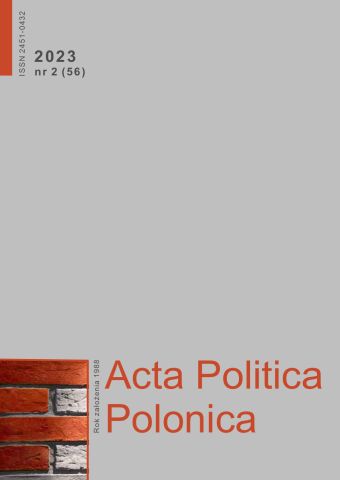ISSN: 2451-0432
eISSN: 2719-4388
OAI
DOI: 10.18276/ap





Protection against ghostwriting and guest authorship
The editors of the biannual journal ‘Acta Politica Polonica’ observe and apply the recommendations of the Poland Ministry of Education and Science regarding protection against ‘ghostwriting’ (undisclosed authorship or co-authorship of an article) and ‘guest authorship’ (false authorship or co-authorship of an article), which are treated as scientific dishonesty. The appearance of such cases will be disclosed by the editorial office by passing appropriate information to the relevant institutions.
Ethical principles applicable to the Editorial Board
Principle of accountability:
The Editorial Board observes the accepted procedures of the publishing process, in particular, concerning the review process.
The editors are responsible for adhering to the principle of scientific integrity, particularly in terms of preventing scientific dishonesty, and the publication of a text is determined solely by its scientific value.
The editorial staff cares for the coherence of the published texts and, in the case of noticed errors, publishes corrections, errata and corrigenda.
The Editorial Board may not, in any way, use a text that has been rejected for publication without the author's consent.
Confidentiality:
All texts sent to the editor and qualified for the review process are subject to the process of anonymous review.
Ethical principles applicable to authors
Principle of the originality of the work:
The submitted text must be original (not published anywhere else) and must indicate appropriate citations. It is unacceptable to submit the same text simultaneously to two different journals for consideration. The work must not involve plagiarism or self-plagiarism or contain false information.
The principle of authorship of the paper:
The person who made a substantive contribution to the scientific text (in the conception, implementation or interpretation of the research) should be disclosed as the author. In the case of a multi-author text, the author submitting the text shall disclose the contribution of the individual authors to the article.
The principle of scientific integrity:
Including reliability in indicating the sources used during the research. The author is obliged to immediately notify the editor of any noticed errors or inaccuracies in the text and cooperate with the editor to withdraw or correct the article.
The author is obliged to indicate the source of funding for the publication or the institution’s (organisation) contribution to the research (financial disclosure).
The principle of preventing conflicts of interest:
The author is obliged to indicate actual and potential conflicts of interest (financial or non-financial).
Ethical principles binding for reviewers
Principle of objectivity and reliability of reviews:
Evaluation of the article should be justified, supported by the reviewer's own argumentation. If an author is suspected of academic dishonesty, in particular plagiarism, the reviewer is obliged to inform the editor.
Timeliness principle:
The review should be delivered within the deadline set by the editor, and if the review cannot be prepared, the editor should be informed immediately.
Principle of confidentiality:
Reviews are written anonymously. The author does not know the names of the reviewers and the reviewers do not know the name of the author (‘double-blind review’). A scientific text under review is a confidential document, which means that the reviewer may not make it available to others, except to persons authorised by the editor.
Principle of preventing conflicts of interest:
A reviewer shall not review an article if there is a conflict of interest between him/her and the author, arising from a collaboration or any other relationship with the authors. A reviewer shall not, without the author’s consent, use a text which has been rejected for publication.
